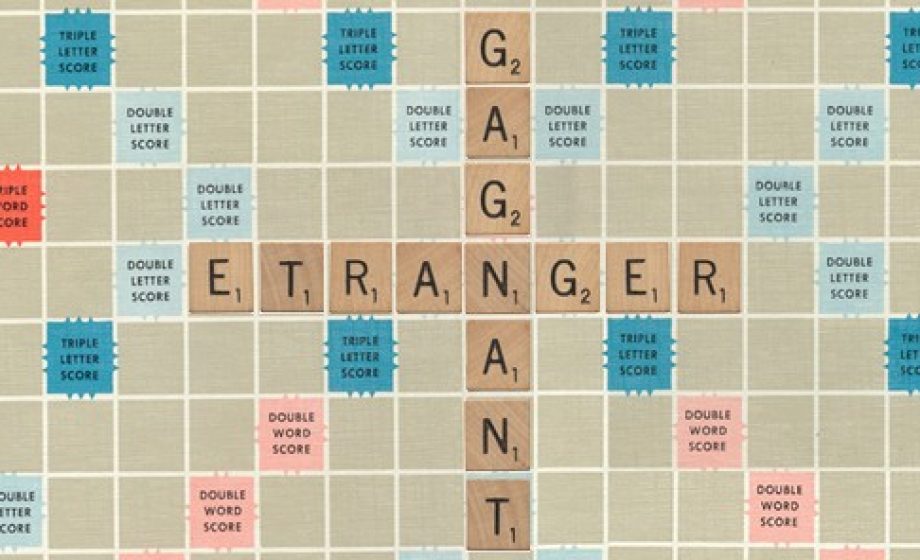 The Championnat Mondial de Scrabble Francophone (the French-language world Scrabble championship) crowned its winner last week: Nigel Richards. If that name doesn’t sound French to you, that’s because it isn’t. Nigel Richards hails from New Zealand. In fact, he doesn’t even know how to speak French!
The Championnat Mondial de Scrabble Francophone (the French-language world Scrabble championship) crowned its winner last week: Nigel Richards. If that name doesn’t sound French to you, that’s because it isn’t. Nigel Richards hails from New Zealand. In fact, he doesn’t even know how to speak French!
New Zealander wins French Scrabble Championship sounds like a satirical headline worthy of The Onion. However, this is not a joke. The 48 year-old Kiwi barely knows a word of French beyond the simple Bonjour. He even required a translator to thank the applauding audience after his victory.
Yet Mr. Richards successfully placed more French words — such as joyaux, yeux, and képis — that collectively scored more points on a French Scrabble board than even native French speakers could do. Simply mind-boggling!
What was Mr. Richards’ secret?
From what I can gather, two primary factors lie behind Mr. Richards’ success. First, Mr. Richards is simply a kick-ass Scrabble player. He has won the English world Scrabble championship three times, the US national championship five times and the UK Open six times. One commentator called him the Scrabble combination of Tiger Woods for golf and Serena Williams for tennis.
Making plans for Nigel
However, it is the second factor that intrigues me most: Richards’ meticulous preparation. How did Nigel plan for the French contest? By memorizing the French dictionary, that’s all! In the nine weeks leading up to the tournament, Mr. Richards memorized large chunks of the French dictionary, particularly focusing on words of two to nine letters in length, which are especially relevant for a Scrabble game.
Mr. Richards had no idea of the meanings of the words he was playing. To him, words are just combinations of letters. As Jean-Baptiste Morel wrote in NouvelObs, “He has learned no language logic, just a succession of letter sequences giving rise to words.” But he didn’t need to.
The human algorithm
Mr. Richards didn’t need to know the meanings of the words. Think about it: in a Scrabble game, that information is mere noise. All that matters is whether the played word is indeed a valid French word. Richards “only” needed to memorize the 160,000 letter combinations that form valid French words.
Big Data startups: I’m thinking of you
If Nigel Richards can win a Scrabble championship in a foreign language by behaving like an algorithm, computers are of course even more effective than most normal humans in maintaining a singular focus on the relevant data while blocking out all irrelevant noise.
This insight did not escape Sergey Brin when he set out five years ago to find a cure for Parkinson’s disease. The Google Founder believed that given the right algorithms, meaningful associations can be drawn from all sorts of unconventional baskets of data. With his deep expertise in algorithms and virtually unlimited computing resources at his disposal, Brin’s Parkinson’s endeavour set out to data-mine reams of patient histories to look for patterns and subsequently dramatically accelerate the process for drug discovery. His process turned the classic scientific method — hypothesis/analysis/peer review/publication — completely on its head.
French pioneer Pharnext (a Truffle portfolio company) espouses a similar philosophy in reconstituting the entire molecular network by data-mining the genomics, transcriptomics, and proteomics of various diseases. Another French innovator, Flaminem, defies conventional wisdom in the auto insurance business by demonstrating that a consumer’s internet browsing habits can provide a more accurate insurance risk profile than traditional actuarial analyses which are predicated largely upon demographic data. Flaminem’s insight allows insurance underwriters to price premiums more precisely.
I have a feeling we’re going to witness more disruption like this in a variety of domains, and this excites me as a VC.

